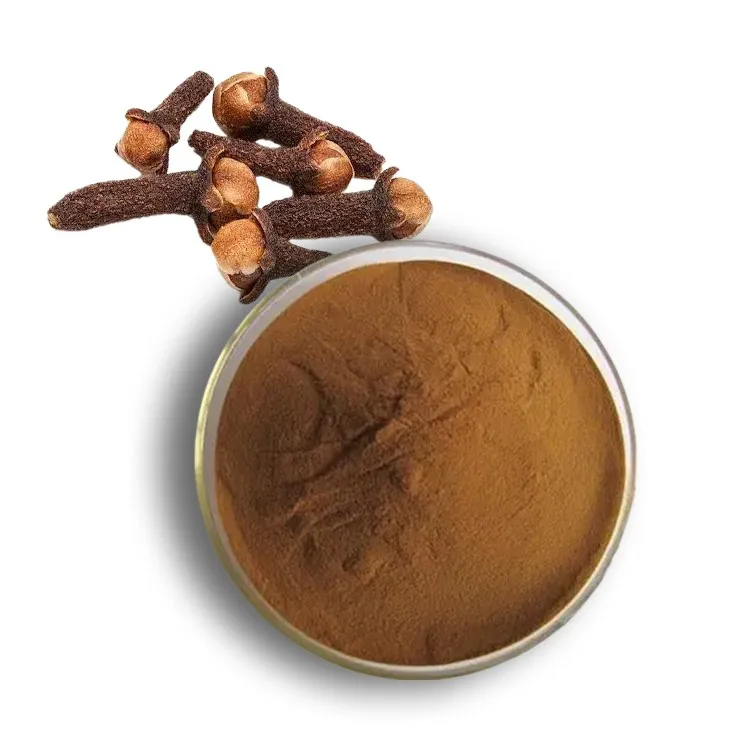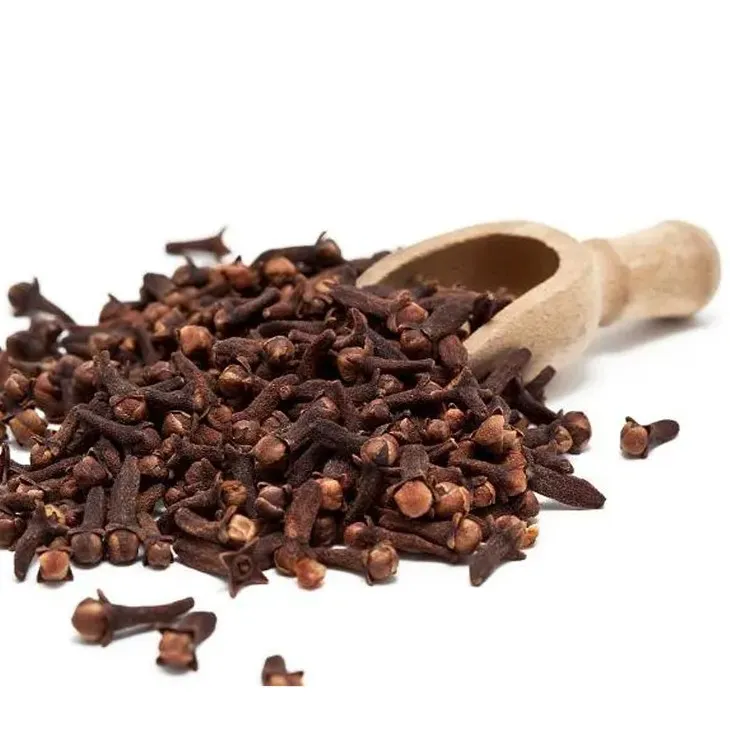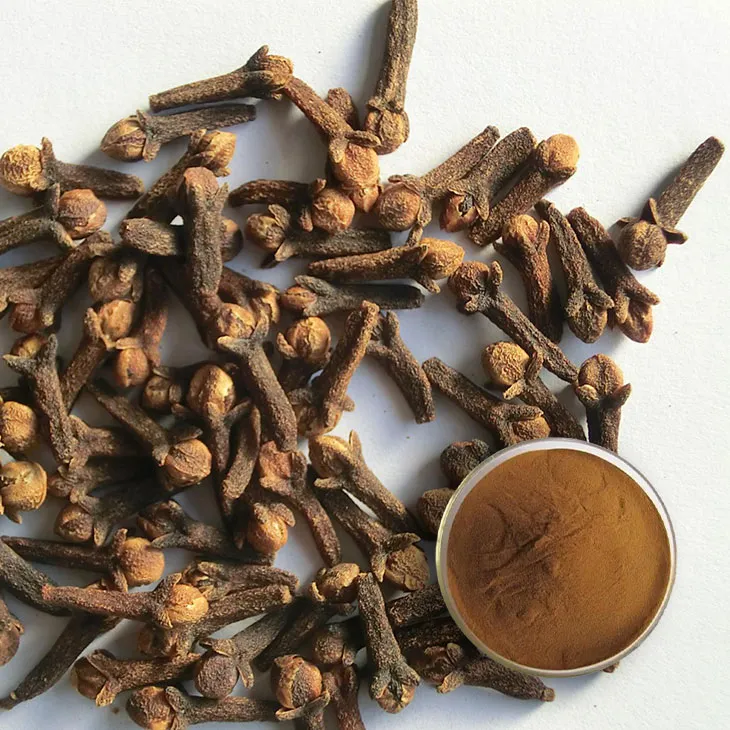- 0086-571-85302990
- sales@greenskybio.com
Understanding the Private Label of Clove Powder: A Comprehensive Guide
2024-12-18

1. Introduction to Clove Powder
Clove Powder is a widely used spice that has a rich history and a variety of applications. Derived from the dried flower buds of the clove tree (Syzygium aromaticum), it has a strong, warm, and sweet aroma with a slightly bitter and pungent taste. Clove Powder is known for its distinct flavor profile, which makes it a popular ingredient in both sweet and savory dishes around the world.

2. Quality Grades of Clove Powder
High - Quality Clove Powder:
- High - quality clove powder is typically made from carefully selected clove buds. These buds are usually large, intact, and free from significant blemishes.
- The color of high - quality clove powder is a deep, rich brown. It has a strong and consistent aroma, which indicates that the essential oils within the cloves are well - preserved.
- When it comes to taste, it offers a balanced combination of sweetness, spiciness, and a hint of bitterness. This type of clove powder is often used in high - end culinary applications and in the production of premium herbal products.
Medium - Quality Clove Powder:
- Medium - quality clove powder may contain a mixture of buds of different sizes. There might be some minor imperfections in the buds used, but overall, they are still suitable for general use.
- The color may be slightly lighter than that of high - quality powder, and the aroma, while still present, might not be as intense. The taste is also less pronounced, with a milder spiciness and sweetness.
- This grade of clove powder is commonly used in everyday cooking and in some mass - produced food items where cost - effectiveness is a key factor.
Low - Quality Clove Powder:
- Low - quality clove powder often contains a significant amount of broken or damaged buds. It may also be contaminated with foreign particles such as dust or small pieces of debris.
- The color can be dull and uneven, and the aroma is weak or even has an off - putting smell. The taste is likely to be unbalanced, with a dominant bitterness or a lack of the characteristic clove flavor.
- Such low - quality clove powder is usually not recommended for consumption, especially in applications where flavor and quality are important. However, it may be used in some industrial processes where the cloves are mainly used for their chemical properties rather than their flavor.

3. Packaging Information
Packaging Materials:
- Glass Containers: Glass is an excellent packaging material for clove powder as it is non - reactive. It helps to preserve the flavor and aroma of the powder by protecting it from external factors such as air, moisture, and light. Glass containers are often used for high - end or specialty clove powder products.
- Plastic Packaging: Plastic bags or containers are more commonly used for mass - produced clove powder. They are cost - effective and provide a certain level of protection. However, plastic is more permeable to air and moisture compared to glass, which may affect the shelf - life of the powder. Some plastic packaging is designed with additional barriers to improve its performance in terms of preservation.
- Metal Containers: Metal cans or tins are also used for packaging clove powder. They offer good protection against physical damage and are relatively impermeable to air and moisture. Metal packaging is often used for products that need to be stored for a long time or for export purposes, as it can withstand rough handling during transportation.
Packaging Labels:
- Product Name: The label clearly states "Clove Powder" to identify the product. In some cases, there may be additional descriptive terms such as "Organic Clove Powder" or "Premium Clove Powder" to indicate the quality or special characteristics of the product.
- Net Weight: The amount of clove powder in the package is clearly marked, usually in grams or ounces. This information is important for consumers to know how much product they are purchasing.
- Ingredients: Besides clove powder, some products may contain additional ingredients such as anti - caking agents. The label should list all the ingredients in descending order of their proportion in the product.
- Origin: The country or region where the clove powder is sourced from is often indicated on the label. This can be important for consumers who prefer products from specific regions or for those who are concerned about the quality and safety standards of different origins.
- Best - Before or Expiry Date: To ensure the quality and safety of the product, the label includes a date indicating the period within which the clove powder should be consumed. This helps consumers to make informed decisions about when to use the product.
- Storage Instructions: Packaging labels may also provide guidance on how to store the clove powder, such as "Store in a cool, dry place away from direct sunlight." Proper storage is crucial for maintaining the quality of the powder.

4. Potential Health Benefits of Clove Powder
Antioxidant Properties:
- Clove powder contains a significant amount of antioxidants, such as eugenol. These antioxidants help to neutralize free radicals in the body, which are unstable molecules that can cause damage to cells and contribute to various diseases, including cancer, heart disease, and aging - related disorders.
- By consuming clove powder, individuals can potentially increase their antioxidant intake, which may support overall health and well - being. Antioxidants also play a role in reducing inflammation in the body, which is associated with many chronic diseases.
Anti - Inflammatory Effects:
- The compounds in clove powder, including eugenol and beta - caryophyllene, have anti - inflammatory properties. They can help to reduce inflammation in the body, which is beneficial for individuals with conditions such as arthritis, asthma, and inflammatory bowel disease.
- These anti - inflammatory effects may also contribute to improved cardiovascular health, as chronic inflammation is a risk factor for heart disease. By reducing inflammation, clove powder may help to lower blood pressure, improve blood lipid profiles, and reduce the risk of blood clots.
Antimicrobial Activity:
- Clove powder has strong antimicrobial properties. It can inhibit the growth of various bacteria, fungi, and viruses. Eugenol, in particular, has been shown to be effective against common pathogens such as Escherichia coli, Staphylococcus aureus, and Candida albicans.
- This antimicrobial activity makes clove powder useful in food preservation, as it can help to prevent the growth of spoilage - causing microorganisms. It may also have potential applications in oral health, as it can combat oral bacteria and help to prevent tooth decay and gum disease.
Digestive Health Benefits:
- Clove powder can stimulate the secretion of digestive enzymes, which helps to improve digestion. It can also relieve digestive problems such as bloating, gas, and indigestion.
- Furthermore, clove powder has been used traditionally to treat intestinal parasites. Its antimicrobial and anti - inflammatory properties may contribute to its effectiveness in this regard.
5. Conclusion
Understanding the private label of clove powder, including its quality grades, packaging information, and potential health benefits, is essential for both consumers and producers. Consumers can make informed choices when purchasing clove powder based on its quality and the information provided on the label. Producers, on the other hand, can ensure that their products meet the expected standards in terms of quality and packaging. Clove powder, with its unique flavor and potential health benefits, continues to be an important ingredient in various industries, from food and beverage to herbal medicine.
FAQ:
Q1: What are the common quality grades of clove powder?
There are generally different quality grades of clove powder. Higher - quality clove powder often has a stronger and more pure aroma. It may be graded based on factors such as the origin of the cloves, the processing method, and the purity. For example, clove powder made from organically grown cloves and processed with advanced techniques may be considered of a higher grade. Also, the color and texture can be indicators. Higher - grade clove powder might have a more uniform color and finer texture.
Q2: How can one interpret the packaging information of clove powder?
The packaging information of clove powder is crucial. It usually includes details such as the net weight, which tells you how much clove powder is inside the package. The expiration date is also important as it indicates the period during which the clove powder can be used safely and retains its quality. Additionally, the packaging may mention the origin of the cloves used to make the powder. Some packages might also provide information about any additives or preservatives, if present. For example, if it is labeled as pure clove powder," it should not contain any other unnecessary substances.
Q3: What are the potential health benefits of consuming clove powder?
Clove powder has several potential health benefits. It contains compounds such as eugenol which has antioxidant properties. These antioxidants can help in fighting free radicals in the body, which may reduce the risk of chronic diseases. Clove powder may also have anti - inflammatory effects, which can be beneficial for conditions related to inflammation. Additionally, it has been traditionally used for its antimicrobial properties, potentially helping to fight against certain bacteria and fungi in the body. However, it should be consumed in moderation as excessive intake may have adverse effects.
Q4: How can one ensure the authenticity of the quality grades mentioned on the label of clove powder?
To ensure the authenticity of the quality grades on the clove powder label, one can look for certain indicators. Firstly, check for certifications. For example, if it claims to be organic, look for relevant organic certifications. Research the brand and its reputation. Reputable brands are more likely to provide accurate information. You can also compare the price. If the price seems too good to be true for a high - grade product, it might be a red flag. Another way is to sample the product if possible. A high - quality clove powder should have a distinct and pleasant aroma and flavor.
Q5: What should one look for in the ingredient list on the clove powder packaging?
When looking at the ingredient list on the clove powder packaging, the main ingredient should be simply "clove powder" if it is pure. However, some products may add other ingredients such as anti - caking agents to prevent clumping. If this is the case, these additives should be clearly listed. It is important to be aware of any potential allergens. For example, if the cloves were processed in a facility that also handles nuts, there may be a risk of cross - contamination, and this should be indicated on the packaging.
Related literature
- "The Chemistry and Pharmacology of Clove (Syzygium aromaticum)"
- "Clove: A Spice with Multiple Health - Promoting Properties"
- "Quality Evaluation of Clove (Syzygium aromaticum) and Its Powder"
- ▶ Hesperidin
- ▶ citrus bioflavonoids
- ▶ plant extract
- ▶ lycopene
- ▶ Diosmin
- ▶ Grape seed extract
- ▶ Sea buckthorn Juice Powder
- ▶ Beetroot powder
- ▶ Hops Extract
- ▶ Artichoke Extract
- ▶ Reishi mushroom extract
- ▶ Astaxanthin
- ▶ Green Tea Extract
- ▶ Curcumin Extract
- ▶ Horse Chestnut Extract
- ▶ Other Problems
- ▶ Boswellia Serrata Extract
- ▶ Resveratrol Extract
- ▶ Marigold Extract
- ▶ Grape Leaf Extract
- ▶ blog3
- ▶ blog4
- ▶ blog5
-
Pure 85% Tomentil Extract.
2024-12-18
-
Cat Claw Extract
2024-12-18
-
Golden Seal Extract
2024-12-18
-
Cranberry Extract
2024-12-18
-
Elderberry Extract
2024-12-18
-
Andrographis Paniculata Extract Powder
2024-12-18
-
Shikone Extract
2024-12-18
-
Grape Leaf Extract
2024-12-18
-
Carrageenan Extract Powder
2024-12-18
-
Senna Leaf Extract
2024-12-18
-
Yellow Pine Extract
2024-12-18





















